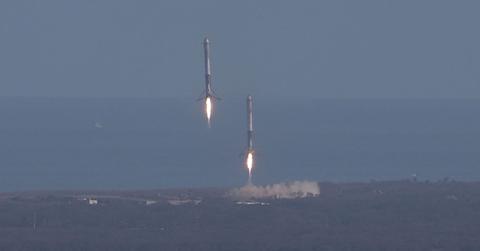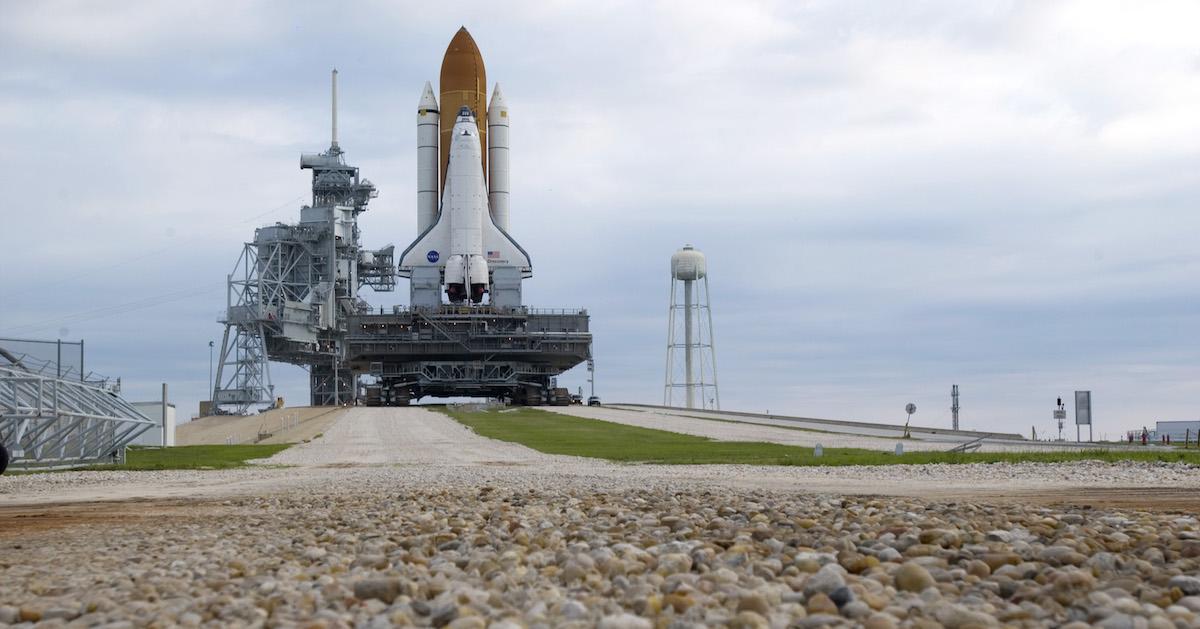Here's What Happens to Rocket Boosters After They Blast Off
Published July 20 2021, 4:34 p.m. ET

With the ongoing billionaire space race, many are understandably curious about the logistics and various costs of space travel. We're painfully aware of the environmental costs of space travel, as rockets emit greenhouse gases and use exorbitant amounts of non-renewable fuels, but what happens to parts that fall into the abyss, like rocket boosters, after they launch? Do they biodegrade after lift-off, or are they recovered and upcycled for future launches?
What happens to rocket boosters after launch?
Rocket boosters work with the main engines of the rocket, effectively thrusting the rocket into space upon lift-off. According to NASA, after traveling about 24 vertical miles, the boosters break away from the rest of the rocket. Those that lift off from NASA space center fall via parachute, and land in the Atlantic Ocean. Solid boosters are intended to float, they are often recovered by ships, brought back to land, and refurbished — so at least all of that material isn't going to waste.
But according to CBC, not all boosters necessarily fall into the ocean after lift-off. Earlier this year, a booster from China went rogue, and was expected to fall through outer space — though nobody could predict its destined location. Since it was descending from the upper atmosphere, however, most of it was set to disintegrate, and a large portion of the remains were likely ocean-bound, due to the vast amount of ocean coverage across the globe. That said, though, it still posed somewhat of a threat to life on Earth.
Depending on where the booster breaks away, debris can sometimes go into orbit if it's already in outer space. This can pose a major threat to astronauts and other space vehicles. Certain space agencies are reportedly making more of an effort to safely dispose of space debris, but nothing definitive has been established as of publication.

Are rocket boosters environmentally safe?
Although no fatalities have resulted from a rogue booster, regulations on falling space junk should probably be set in stone after 65 years of traveling to space. But unfortunately, the regulations are few and far between. Not all rocket boosters that fall into the ocean are successfully recovered, as some don't float. According to Space Stack Exchange, experts predict there could be about 10 boosters lying on the ocean floor, failing to disintegrate.
Certain boosters, like the one in China which didn't break away properly, can descend unpredictably, while others that go into orbit, as previously mentioned, can endanger scientists and astronauts in outer space. Boosters haven't really had much in the way of a visible environmental impact yet, though it would probably be better to avoid those kinds of potentially dangerous repercussions through stricter regulations of where they can break away.
Regardless of what happens to the boosters, though, these disproportionately wealthy people should probably be paying higher taxes, donating to those in need, and solving real world issues instead of traveling to space for fun (ahem, Bezos, Musk, and Branson). Leave the space travel (and impact of space travel) to those who are actually making a difference in the world of science.